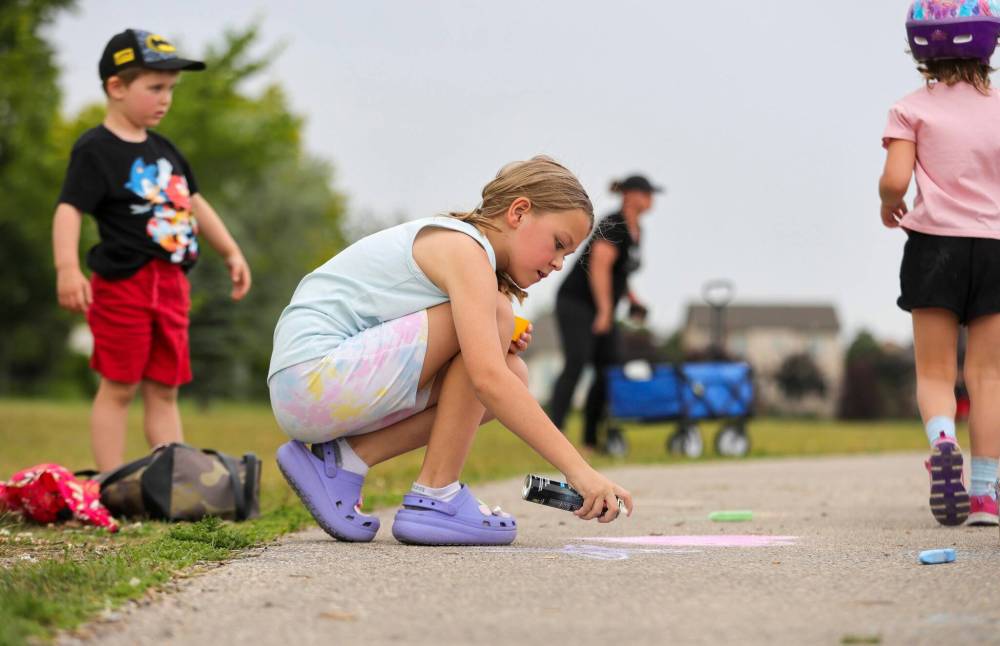Cool temperatures keep cap on city mosquito counts
Advertisement
Read this article for free:
or
Already have an account? Log in here »
To continue reading, please subscribe:
Monthly Digital Subscription
$0 for the first 4 weeks*
- Enjoy unlimited reading on winnipegfreepress.com
- Read the E-Edition, our digital replica newspaper
- Access News Break, our award-winning app
- Play interactive puzzles
*No charge for 4 weeks then price increases to the regular rate of $19.00 plus GST every four weeks. Offer available to new and qualified returning subscribers only. Cancel any time.
Monthly Digital Subscription
$4.75/week*
- Enjoy unlimited reading on winnipegfreepress.com
- Read the E-Edition, our digital replica newspaper
- Access News Break, our award-winning app
- Play interactive puzzles
*Billed as $19 plus GST every four weeks. Cancel any time.
To continue reading, please subscribe:
Add Free Press access to your Brandon Sun subscription for only an additional
$1 for the first 4 weeks*
*Your next subscription payment will increase by $1.00 and you will be charged $16.99 plus GST for four weeks. After four weeks, your payment will increase to $23.99 plus GST every four weeks.
Read unlimited articles for free today:
or
Already have an account? Log in here »
Hey there, time traveller!
This article was published 18/07/2023 (844 days ago), so information in it may no longer be current.
The past few weeks, many Winnipeggers have found themselves wearing longer sleeves on evening walks and noticing the seeming absence of buzzing, biting mosquitoes.
They’re not imagining it. According to David Wade, superintendent of the insect control branch, the City of Winnipeg caught an average of seven mosquitoes in each of its traps this week, compared to an average of 21 at this time last year.
Wade said the recent weather — specifically low precipitation and cold evening temperatures — and the lack of mosquitoes are related.

RUTH BONNEVILLE / WINNIPEG FREE PRESS FILES
Throughout July, daily lows have been dropping into single digits in Winnipeg.
“Overall, there are less mosquitoes out there compared to last year,” Wade said Tuesday. “The low temperatures that we’ve been experiencing in the last couple of weeks have also impacted activity levels.”
Throughout July, daily lows have been dropping into single digits in the Manitoba capital, mirroring back-to-school season more than the heart of summer. As mosquitoes tend to function at temperatures above 10 C, evening activity levels have demonstrably dropped.
On July 8, Winnipeg experienced its lowest temperature on that date in 26 years, at 5 C. Two days later, it broke another record at 5.6 C.
On July 10, 2021, Winnipeg set its record at 33.9 C.
Meanwhile, other parts of the world are experiencing record heat waves. During the first week of July, the average global temperature reached the hottest on record, at 17.8 C.
Terri Lang, a meteorologist with Environment and Climate Change Canada, said the recent temperatures in Winnipeg, while low, are not that uncommon for July. The average temperature for July 2023 currently sits at 23.8 C, which is only 1.6 degrees colder than last year’s monthly average.
Lang believes people have a “recency bias” when it comes to weather, meaning they compare it to the recent past, rather than historical trends.
“There’s a bit of bias because May and June were so hot. Now, everyone is kind of wondering why it isn’t hot anymore,” Lang said. “It hasn’t been spectacularly cold. It’s on the cool side, but compared to average, it hasn’t been outrageously cold.”
With the low mosquito counts, Wade said the city has yet to fog for the pests. However, a bout of heavy rain could easily change that, he added.
Mosquito counts would have to reach an average of 25 trap captures over two consecutive days to begin the fogging program, Wade said. Moisture content, weather and the age of the mosquitoes in the traps are also deciding factors.
In the coming years, the effects of climate change could alter the mosquito population in Manitoba, too. Hotter, drier climates drive mosquitoes away, but extreme rain could increase the population, Wade said.
“The bigger concern with climate change is that the geographical range of mosquitoes will expand,” he said. “Species that are currently in the United States, for example, may expand into southern Canada.”
Meantime, for Winnipeggers who dread having to wear a light jacket on the patio, some heat is likely on the horizon, Lang said, with daily highs of 26 C-plus forecast July 20-24.
cierra.bettens@freepress.mb.ca


